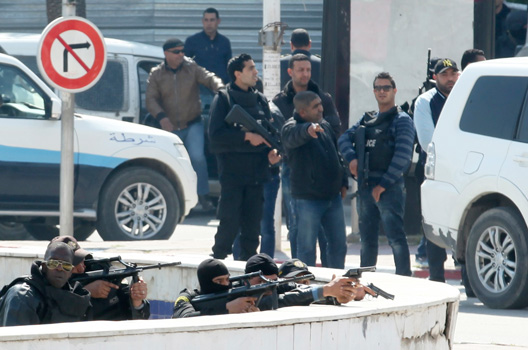
Terrorist rampage in Tunis may force government to shift focus, says Atlantic Council’s Mezran
Tunisia’s new government may be forced to clamp down on security following the March 18 terrorist attack on a prominent museum in the heart of Tunis. This could jeopardize the country’s nascent political process, says Atlantic Council analyst Karim Mezran.
“If that happens, it is not good news for Tunisians as it could derail the political transition in a country that has provided the only good news emerging from the Arab Spring,” Mezran, a Resident Senior Fellow in the Atlantic Council’s Rafik Hariri Center for the Middle East, said in an interview with the New Atlanticist.
Tunisian Prime Minister Habib Essid’s secular-Islamist coalition government came to office in February. But his biggest security challenge came on Tuesday, when gunmen dressed in military uniforms attacked the prominent National Bardo Museum, killing at least twenty-two people, including seventeen tourists.
Mezran said Essid’s initial response to the attack has been “encouraging.”
The Prime Minister “talked about national unity and the coalescing of political forces to defend the state,” he said. Following the 2013 assassinations of two prominent political leaders—Chokri Belaid and Mohamed Brahmi—accusations against the Islamists unsettled Tunisia’s nascent political scene.
Tunisia’s last large-scale terrorist attack against tourists took place in April 2002, when al-Qaeda took responsibility for a truck bombing at the El Ghriba synagogue in Djerba. Nineteen people, mostly Germans, died in that incident.
While no group has yet claimed responsibility for the Tunis museum attack, the incident underscored the many security problems Tunisia faces, especially along its porous border with Libya, whose political chaos and resulting security vacuum has been exploited by militants affiliated with the Islamic State in Iraq and al-Sham (ISIS).
The attack in Tunis came days after Libyan troops killed Ahmed Al-Roussi—a Tunisian member of ISIS—near the town of Sirte.
“If it emerges that the hostage takers in Tunis have links to ISIS, that will further underscore the dangers Libya is posing to its neighbors,” said Mezran.
Mezran spoke in an interview with the New Atlanticist’s Ashish Kumar Sen. Excerpts below:
Q: What will be the likely fallout from this attack at the National Bardo Museum in Tunis?
Mezran: There is a real possibility that the Tunisian government will clamp down on security. If that happens, it is not good news for Tunisians as it could derail the political transition in a country that has provided the only good news emerging from the Arab Spring.
Prime Minister Habib Essid’s secular-Islamist coalition government only took power last month. Now it faces this challenge. There is a danger Tunisia will revert to its old ways of security first.
Q: How has the Tunisian government responded to this attack?
Mezran: Following the assassination of the two political leaders Chokri Belaid and Mohamed Brahmi in 2013, the media and the political forces started accusing the Islamists, including Ennahda, thus causing a rift within the political structure.
This time the Prime Minister has, in his first remarks since the attack, talked about national unity and the coalescing of political forces to defend the state. That is an encouraging sign.
Q: Has the instability in neighboring Libya contributed to Tunisia’s problems?
Mezran: The attack at the museum will definitely put a spotlight on the porous border Tunisia shares with Libya and the spillover effect from the militant problem in that country. This is a challenge that is also true for Egypt.
The attack at the museum comes days after Ahmed Al-Roussi, a Tunisian who led a contingent of Islamic State in Iraq and al-Sham (ISIS) fighters in Libya, was killed in clashes with Libyan troops near the town of Sirte. If it emerges that the attacker in Tunis have links to ISIS, that will further underscore the dangers Libya is posing to its neighbors.
Ashish Kumar Sen is a staff writer at the Atlantic Council.
Image: Police officers are seen outside Parliament in Tunis March 18. Gunmen attacked Tunisia's National Bardo Museum near Parliament on March 18 killing at least seventeen tourists. (REUTERS/Zoubeir Souissi)

